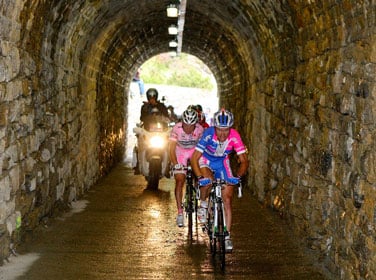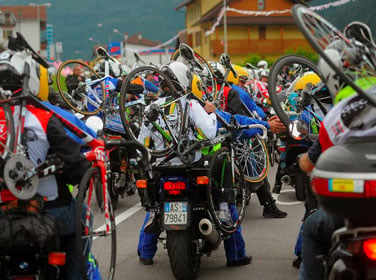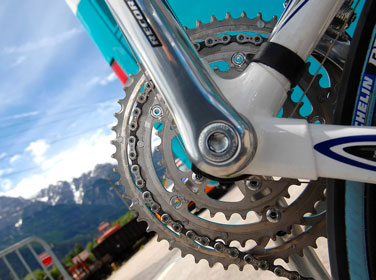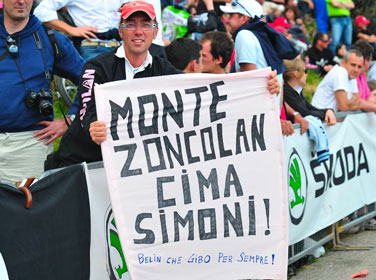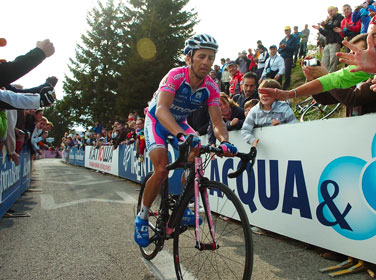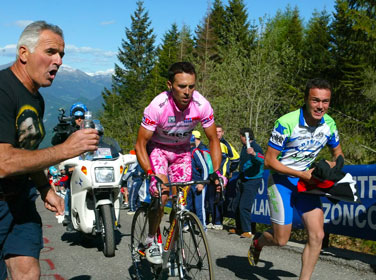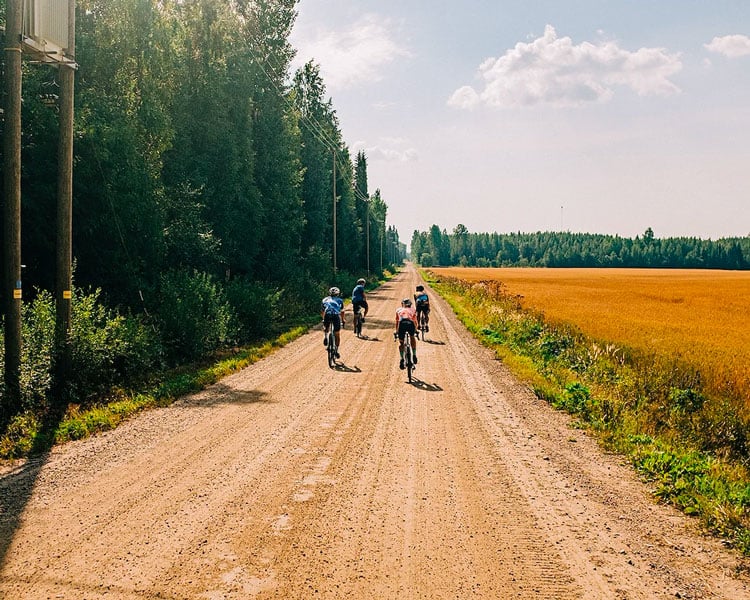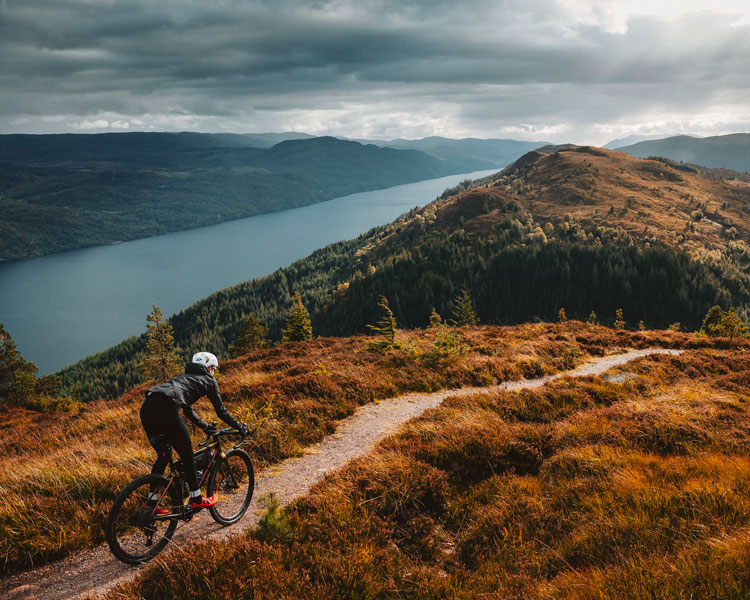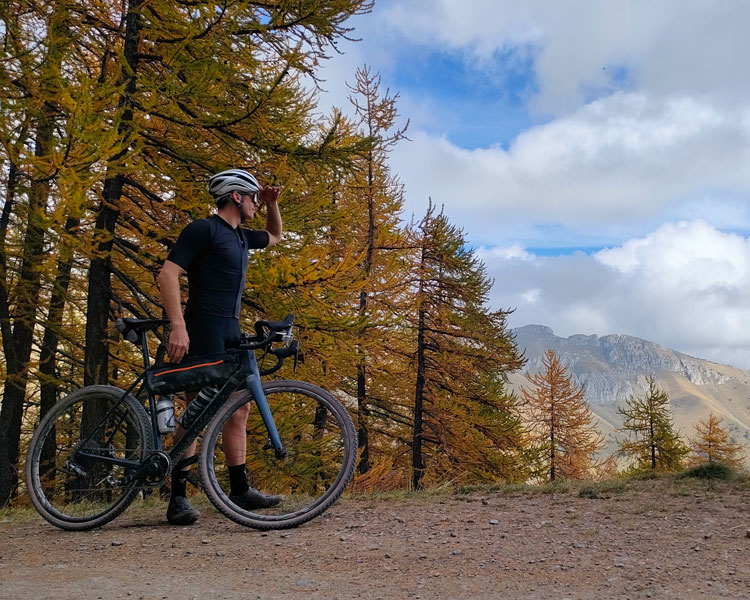
MONTE ZONCOLAN
The super-steep Zoncolan is known as one of the toughest in cycling and has therefore achieved mythical status. It has been raced six times in Giro history, all since 2003, and the last five of them on the demanding side of Ovaro, which is the hardest side, with 10.1 kilometers at 11.9%.
The Zoncolan can be climbed from three sides; this year’s stage 14 takes the eastern and more “gentle” approach in Sutrio. This is the easiest (well, least murderous) of the three approaches to Monte Zoncolan. The altitude gain is the same on both sides, but the length is different. The Sutrio ascent is 14.1 kilometers long and the average gradient sits at 8.5%, with the last 3 kilometers at 13%, and even ramping up to 27% inside the last 500 meters.
The Zoncolan can be climbed from three sides; this year’s stage 14 takes the eastern and more “gentle” approach in Sutrio. This is the easiest (well, least murderous) of the three approaches to Monte Zoncolan. The altitude gain is the same on both sides, but the length is different. The Sutrio ascent is 14.1 kilometers long and the average gradient sits at 8.5%, with the last 3 kilometers at 13%, and even ramping up to 27% inside the last 500 meters.

Saturday's stage is pretty straightforward and easy to control by the GC teams. At 205 kilometers and featuring an elevation gain of 3,700 meters, the race takes in two climbs, the first being Forcella di Monte Rest. After approximately 130km of riding, 10.5 kilometers at 5.9%, is a perfect way to test the legs ahead of what’s in store in the finale on the epic Monte Zoncolan.
“The Zoncolan is so hard that every rider is locked in a personal fight against gravity rather than their rivals.” – Ryder Hesjedal, 2012 Giro d’Italia winner
EPIC is the only word to describe the ride up to Monte Zoncolan. We have ridden some amazing mountains in Italy, France, Switzerland, and Spain, but never come anything close to the likes of the Zoncolan. It’s hard but not painful, a grinding slow-mo effort out of the saddle. It takes such an effort to accelerate that the wise idea is to measure your effort rather than make a show on the steep pitches. It’s a relentless ramp where even the best climbers ascend at 7 or 8 kilometers an hour.
IS THE ZONCOLAN REALLY THAT STEEP?
Team cars are not allowed up; team mechanics bring up spare bikes and wheels on the backs of motorbikes. The climb is not too steep nor are the tunnels at the top too narrow for team cars – it’s just that motorbikes take up less space on the small road with a crowd of people along it.
When a steep climb appears in a stage race, it is often compared to the Zoncolan. The Zoncolan is hard, but it has its rivals: the Mortirolo or the nearby Monte Crostis, which was raced by the Giro d’Italia last in 2011.
Monte Zoncolan is often compared with Alto de l’Angliru in northern Spain, first included in 1999 in the Vuelta a España, with the steepest (but short) pitch featuring a 23.6% gradient, and it is part of a kilometer stretch that averages “only” 17.2%. The grueling, leg-shattering 10.1-kilometer ascent from Ovaro to the top of Monte Zoncolan, however, has a kilometer at nearly 20%.
When a steep climb appears in a stage race, it is often compared to the Zoncolan. The Zoncolan is hard, but it has its rivals: the Mortirolo or the nearby Monte Crostis, which was raced by the Giro d’Italia last in 2011.
Monte Zoncolan is often compared with Alto de l’Angliru in northern Spain, first included in 1999 in the Vuelta a España, with the steepest (but short) pitch featuring a 23.6% gradient, and it is part of a kilometer stretch that averages “only” 17.2%. The grueling, leg-shattering 10.1-kilometer ascent from Ovaro to the top of Monte Zoncolan, however, has a kilometer at nearly 20%.
GEARS AND POWER
The extreme gradients on the Zoncolan will see the pro riders using 50x34 compact or 52/36 semi-compact cranksets and special gears, with 11-28, 11-30, or 11-32 sprockets on the back. Struggling riders will see their cadence drop to 45 rpm or lower, as it’s hard to maintain a consistent rhythm to stay in the race.
Power prediction: 360-450 W: 5.5 to 6 W/kg for the climb. Short power attacks at 500 W or more.
Power prediction: 360-450 W: 5.5 to 6 W/kg for the climb. Short power attacks at 500 W or more.
SOME HISTORY
The super-steep Zoncolan, at the northeastern edge of Italy, has been raced six times in Giro history, all since 2003, and the last five of them on the demanding side of Ovaro. The climb is known as one of the toughest in cycling and has therefore achieved mythical status.
Gilberto Simoni, a two-time winner (2003 and 2007) summed the climb up perfectly: “It’s like a slow execution; the easiest part of the Zoncolan is harder than the most difficult at the Tour.”
Gilberto Simoni, a two-time winner (2003 and 2007) summed the climb up perfectly: “It’s like a slow execution; the easiest part of the Zoncolan is harder than the most difficult at the Tour.”
“It’s like a slow execution; the easiest part of the Zoncolan is harder than the most difficult at the Tour.” – Gilberto Simoni, two-time Giro d'Italia winner
Simoni took the race into his hands in 2003 as the main protagonist on the climb up the Zoncolan from Sutrio in an epic stage 12. With 100,000 tifosi along the road waiting for the spectacle of the riders racing up the terrible ramps of Monte Zoncolan, Simoni took charge of the stage and consolidated his hold on the maglia rosa and his second Giro d’Italia victory.
In 2007, during stage 17, the Zoncolan was featured for a second time, using the more demanding road from Ovaro. The stage was again won by Simoni (riding for the Castelli-equipped Team Saunier-Duval), followed by his teammate Leonardo Piepoli.
In 2007, during stage 17, the Zoncolan was featured for a second time, using the more demanding road from Ovaro. The stage was again won by Simoni (riding for the Castelli-equipped Team Saunier-Duval), followed by his teammate Leonardo Piepoli.
The climb featured once again in the 15th stage of the 2010 Giro d’Italia, where Ivan Basso won after dropping Cadel Evans. That would eventually prove to be the decisive stage of that year’s Giro.
The following year, 2011, the climb featured in the Giro d’Italia again, during stage 14, which was won by Igor Antón, followed by Alberto Contador and Vincenzo Nibali.
The following year, 2011, the climb featured in the Giro d’Italia again, during stage 14, which was won by Igor Antón, followed by Alberto Contador and Vincenzo Nibali.
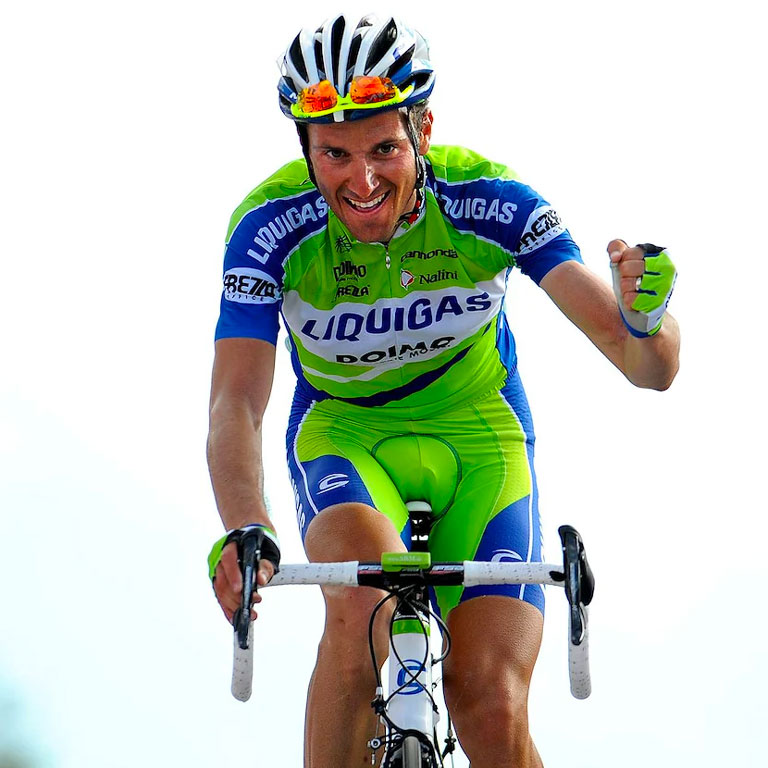
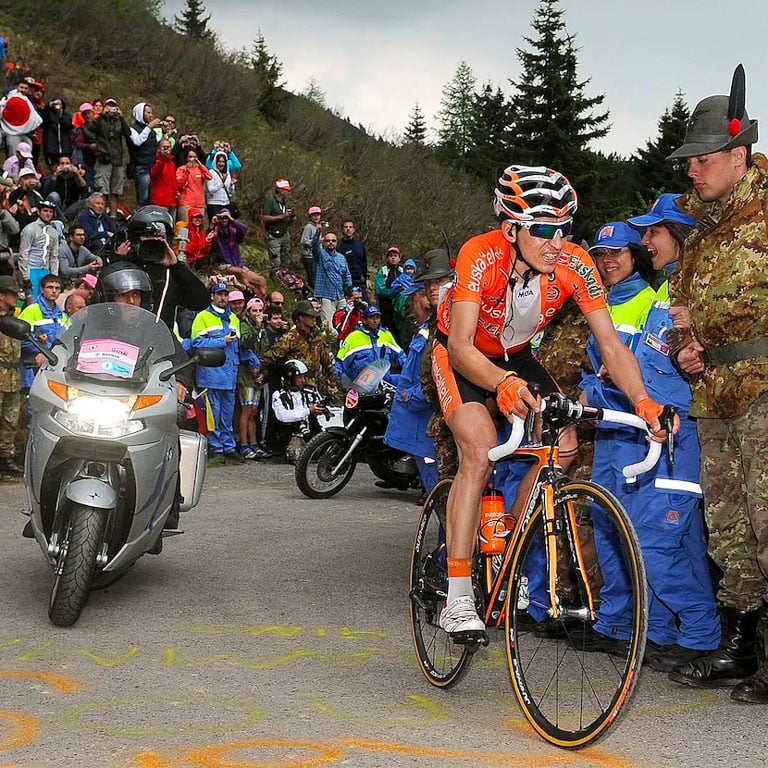
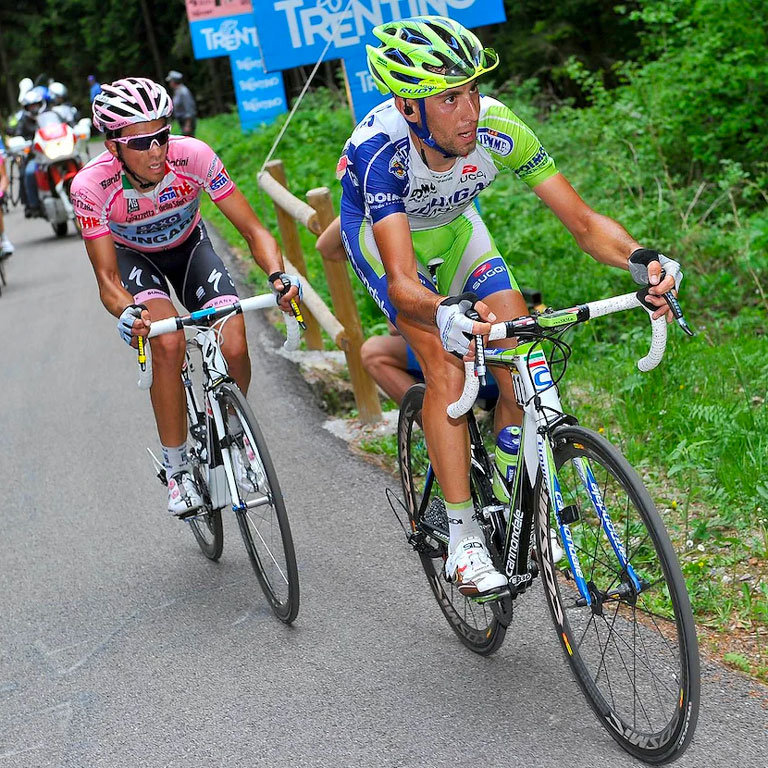
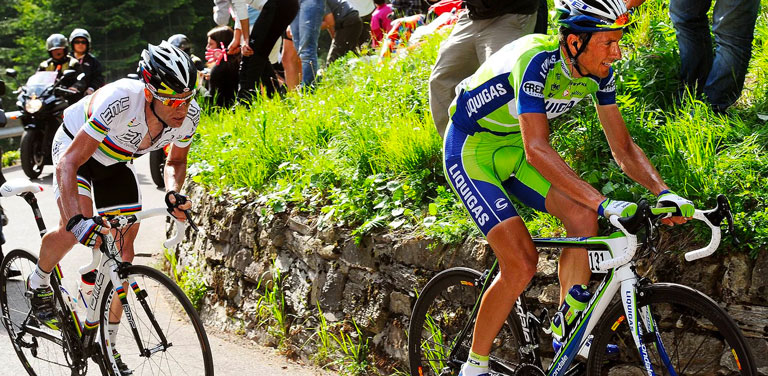
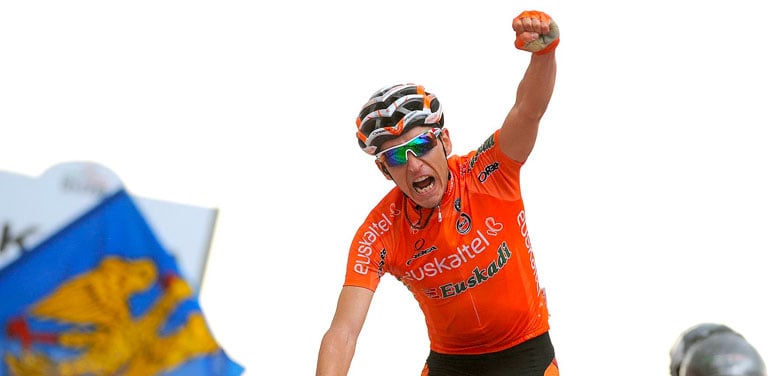
The penultimate stage of the 2014 Giro saw Michael Rogers cross the line first. The Australian joined a 20-rider break 12 kilometers into the 167-kilometer stage. With 6 kilometers remaining on the steep Zoncolan, Franco Pelizotti forced the pace to split the breakaway group to pieces.
He was joined by Rogers and Manuel Bongiorno shortly thereafter. At this point, they had a 6-and-a-half-minute advantage on the peloton, so a stage victory was up for grabs. Rogers rode in solo 38 seconds ahead of Pellizotti and 49 seconds ahead of Bongiorno to win a stage finishing on the summit of one of the hardest climbs in cycling.
He was joined by Rogers and Manuel Bongiorno shortly thereafter. At this point, they had a 6-and-a-half-minute advantage on the peloton, so a stage victory was up for grabs. Rogers rode in solo 38 seconds ahead of Pellizotti and 49 seconds ahead of Bongiorno to win a stage finishing on the summit of one of the hardest climbs in cycling.
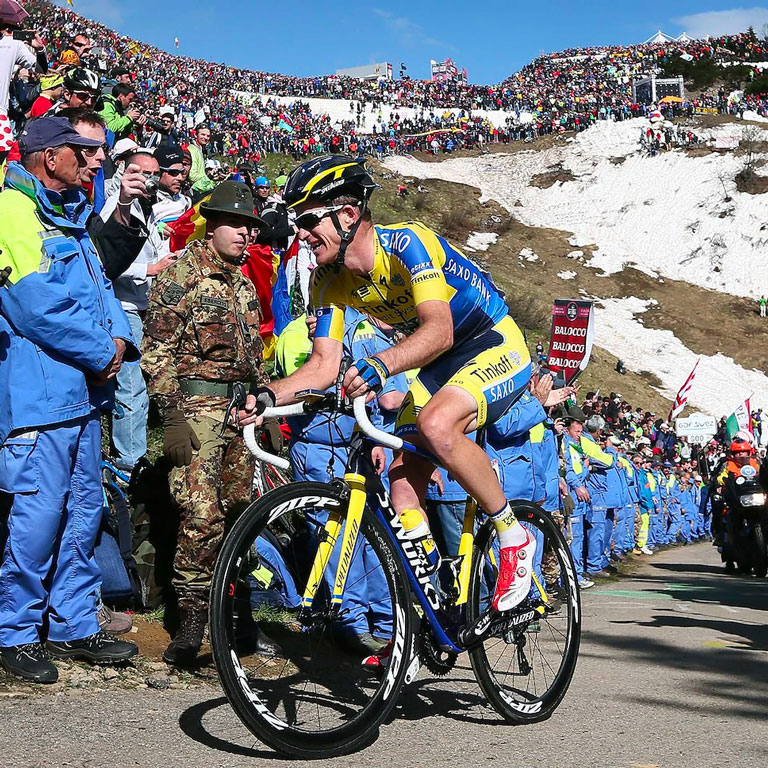
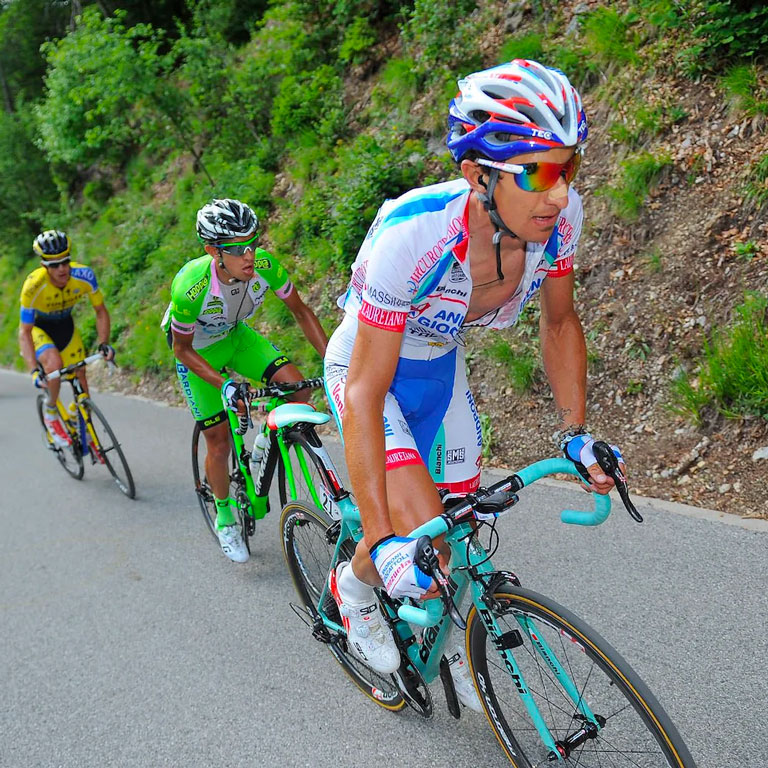
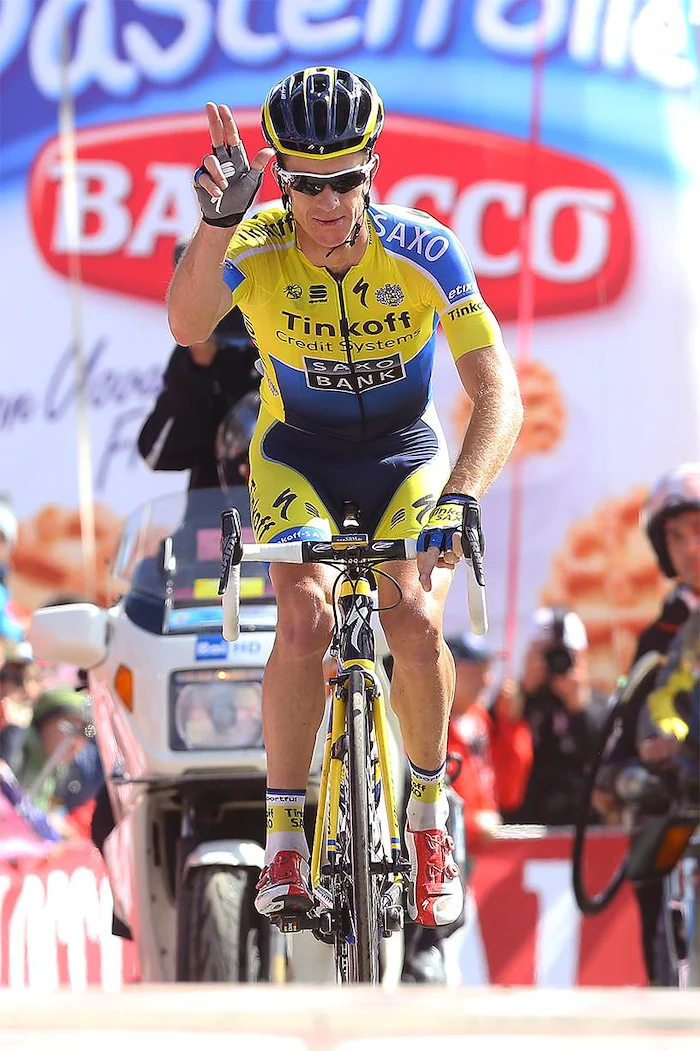
The last time Monte Zoncolan was featured was in the 2018 Giro, during stage 14th, which was won by Chris Froome after an impressive ride, and before sealing his overall victory the following week on the dirt roads of the notoriously difficult Colle delle Finestre.
WHO WILL WIN ON SATURDAY?
Who will write his name into the history books, and maybe add his name to the list of Giro d'Italia champions?
FOOTNOTES
Photos | Jered Gruber, GettySport, Stefano Sirotti
Photos | Jered Gruber, GettySport, Stefano Sirotti
